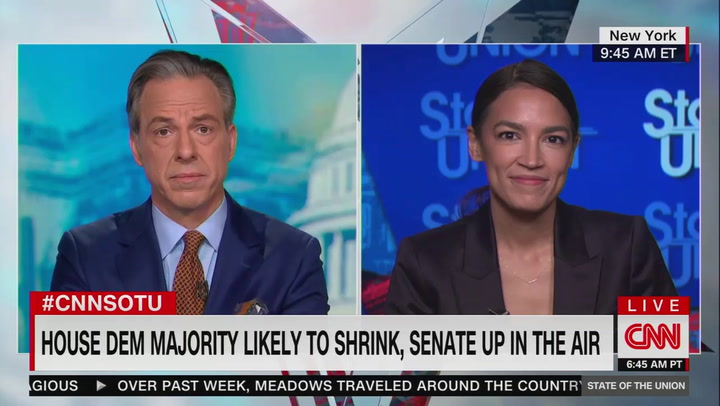AOC says Democratic Party's digital operations are "extraordinarily weak"
Axios NOV 8,2020

VIDEO
https://www.axios.com/aoc-democrats-digital-operation-bbb7fc6f-b370-478a-8984-900455437f49.html
Progressive member of Congress Alexandria Ocasio-Cortez (D-N.Y.) said Sunday that parts of the official Democratic Party campaign apparatus are "extraordinarily weak" and that the left was not to blame for defeats in the House.
Driving the news: After Democrats lost several key house races in divided districts, moderates were furious and pointing fingers at the progressive wing of the party. Rep. Abigail Spanberger (D-Va.), who is narrowly leading her Republican challenger, vented on a caucus call that Democrats should never "use the words socialist or socialism ever again."
What she's saying: "If you look at some of these some of the arguments that are being advanced, that 'defund the police hurt' or that arguments about socialism hurt, not a single member of Congress that I'm aware of campaigned on socialism or defunding the police in this general election," Ocasio-Cortez told CNN's "State of the Union."
"I believe that there are many areas that we can point at in centralized democratic operations that are extraordinarily weak. For example, our digital campaigning is very weak. This is an area where Republicans are actually quite strong."
"I believe that many Republicans were very effective at digital organizing strategy as well, whereas the Democratic Party is still campaigning largely as though it's 2005. And I know a lot of us don't want to hear this, but 2005 was 15 years ago. So we can do better."
Ocasio-Cortez told the New York Times earlier this week she tried to help swing district Democrats.
"And every single one of them, but five, refused my help. And all five of the vulnerable or swing district people that I helped secured victory or are on a path to secure victory."
GOP & WALL ST DEMS RED BAIT
AOC urges Democrats to ’not fight each other’
Rep. Alexandria Ocasio-Cortez on Sunday said it was "irresponsible" for fellow Democrats to point fingers at each other over the party's weak showing in House races, warning that it would only inflame deep tensions.
© Tom Williams/AP Photo
Rep. Alexandria Ocasio-Cortez said: “It's irresponsible to pour gasoline on what is already very delicate tensions in the party.”
The New York Democrat, an icon of the party's progressive wing, appeared on CNN “State of the Union” as House Democrats faced the prospect of holding a thinner majority heading into the next Congress than they had after the 2018 election.
Some House Democratic leaders and other moderates warned last week that moving too far left cost the party House seats and imperiled the party's hopes of capturing the Senate, which will be determined by two runoff races in Georgia in January. Rep. Abigail Spanberger, a "Blue Dog" Democrat from Virginia, warned colleagues on a private call after the election that "no one should say ‘defund the police’ ever again."
Ocasio-Cortez rejected that criticism on Sunday.
"When we kind of come out swinging not 48 hours after Tuesday, and we don't even have solid data yet, pointing fingers and telling each other what to do, it deepens the division in the party," she said. "And it's irresponsible. It's irresponsible to pour gasoline on what is already very delicate tensions in the party.”
Spanberger who drew headlines for her criticisms last week, is slightly ahead in her race but it has yet to be called. At least seven House Democratic incumbents lost their seats — two in Florida and one each in Iowa, Oklahoma, New Mexico, South Carolina and Minnesota.
The debate was the dominant theme among Democrats appearing on political talk shows Sunday, even as the party celebrated projections that Joe Biden won the presidency.
Rep. Jim Clyburn (D-S.C.), the No. 3 Democrat in the House, said on NBC's "Meet the Press" that fears about the socialism label and the phrase "Defund the police" weighed on Democratic candidates including those in his state, citing the failed Senate campaign of Jamie Harrison and the unsuccessful reelection effort of Rep. Joe Cunningham.
"I just hope that going forward we will think about each one of these congressional districts and let people represent their districts," he said.
Sen. Joe Manchin (D-W. Va.), a centrist, said on CBS' "Face the Nation" that Biden lost in his state because Democrats "didn't have a good message." He said voters "went from being mad [in 2016] to being scared in 2020." Biden lost West Virginia by by nearly 40 percentage points.
"They were scared of this socialism that was thrown out there by a radical part of the so-called left," Manchin said. "That hung on and hung on strongly, and it's not who we are. ... I have fought against that. Joe Biden has fought against that."
Ocasio-Cortez, who was easily reelected, said Democrats instead should focus on campaign operations that are more resilient to Republican attacks, in part by improving what she called a "very weak" digital campaign apparatus.
She warned that with a slimmer majority, "it's going to be more important than ever for us to work together and not fight each other."
"There are, at least in the House caucus, very deep divisions within the party," she said. "We need to really come together and not allow Republican narratives to tear us apart."
Rep. Ilhan Omar (D-Minn.), a member of “The Squad” with other progressive female lawmakers including Ocasio-Cortez, said on CNN’s “Inside Politics” that Democrats’ approach “shouldn't be to attack one another and to allow the Republicans — who benefit when we are a divided House — to have the last word.”
Alexandria Ocasio-Cortez Says Progressives Aren't the Enemy After Biden's Victory, Reveals She's Not Sure How Long She'll Be in Politics
Jason Lemon
Representative Alexandria Ocasio-Cortez, a progressive Democrat from New York, pushed back against criticism targeting her left-wing coalition in a new interview, while also saying that she remains uncertain about her political future.
© BRIAN SNYDER/POOL/AFP/Getty
Representative Alexandria Ocasio-Cortez (D-New York) speaking in a video feed during the second day of the Democratic National Convention, held virtually amid the novel coronavirus pandemic, at its hosting site in Milwaukee, Wisconsin on August 18
Ocastio-Cortez, who describes herself as a democratic socialist, has been at odds with moderates in her party since she defeated former Democratic Representative Joe Crowley in the 2018 primary midterms. Although the congresswoman backed Senator Bernie Sanders against Biden in the Democratic presidential primaries, she and fellow progressive Democrats rallied in support of President-elect Joe Biden as he campaigned against President Donald Trump.
In a new interview published by The New York Times on Saturday, Ocasio-Cortez argued that campaigning by her progressive colleagues helped propel Biden to victory.
"I've been begging the party to let me help them for two years. That's also the damn thing of it. I've been trying to help. Before the election, I offered to help every single swing district Democrat with their operation. And every single one of them, but five, refused my help. And all five of the vulnerable or swing district people that I helped secure victory or are on a path to secure victory," the congresswoman said.
"And every single one that rejected my help is losing. And now they're blaming us for their loss," Ocasio-Cortez told The Times. "So I need my colleagues to understand that we are not the enemy. And that their base is not the enemy. That the Movement for Black Lives is not the enemy, that Medicare for all is not the enemy."
Democrats won the presidency and picked up at least one additional seat in the Senate, but Republicans managed to pick up several seats in the House of Representatives. Democrats maintained their majority in the House, however.
Ocasio-Cortez pointed to the grassroots campaigning by fellow progressive Representative Rashida Tlaib of Michigan in her key battleground state, as well as the efforts by activists in Arizona, Georgia, Nevada and Pennsylvania—saying these actions appeared to be key to Biden's victory in the Electoral College. She voiced concern over comments from some of Biden's Republican and moderate backers about how the president-elect should act once he enters the White House.
"These transition appointments, they send a signal. They tell a story of who the administration credits with this victory. And so it's going to be really hard after immigrant youth activists helped potentially deliver Arizona and Nevada. It's going to be really hard after Detroit and Rashida Tlaib ran up the numbers in her district," Ocasio-Cortez pointed out.
"If the party believes after 94 percent of Detroit went to Biden, after Black organizers just doubled and tripled turnout down in Georgia, after so many people organized Philadelphia, the signal from the Democratic Party is the John Kasichs won us this election? I mean, I can't even describe how dangerous that is," she said. Kasich, a Republican, served as Ohio's governor from 2011 to 2019. He endorsed Biden but his state went for Trump.
Newsweek reached out to press representatives for Biden to ask for comment on Ocasio-Cortez's remarks, but they did not immediately respond. In a victory speech on Saturday evening, after the Associated Press and networks officially called the race, Biden voiced his plan to be unifying president.
"To my campaign team, and all the volunteers, to all those who gave so much of themselves to make this moment possible, I owe you everything. And to all those who supported us: I am proud of the campaign we built and ran. I am proud of the coalition we put together, the broadest and most diverse in history," Biden said.
"Democrats, Republicans and independents. Progressives, moderates and conservatives. Young and old. Urban, suburban and rural. Gay, straight, transgender. White. Latino. Asian. Native American," the president-elect said.
Ocasio-Cortez has taken aim at criticism from moderates and Republican Biden-backers on Twitter over the last 24 hours. "John Kasich, who did not deliver Ohio to Dems, is saying folks like @IlhanMN, who did deliver Minnesota, are the problem," she tweeted on Saturday. "Please don't take these people seriously and go back to celebrating and building power."
"I've been thinking so much of @IlhanMN. Trump made Minnesota explicitly about HER. Said he'd win because of her. Many Dems in DC believed him, & marginalized her. That burden wasn't fair, but she took on the challenge anyway. She won," Ocasio-Cortez wrote in another post. "Credit and respect her. @RashidaTlaib too."
Just a friendly reminder: @AOC isn’t the enemy or a threat, she is an asset to our party.
When you allow the GOP to dictate who should be included in our “big tent†party, we all lose.
For god’s sake, the GOP has QAnon members in their ranks and won’t throw them under the bus. https://t.co/Stn0DP75wS— Ilhan Omar (@IlhanMN) November 8, 2020
Representative Ilhan Omar, a progressive Democrat from Minnesota, shared Ocasio-Cortez's interview in a Sunday Twitter post. The congresswoman wrote: "Just a friendly reminder: @AOC isn't the enemy or a threat, she is an asset to our party. When you allow the GOP to dictate who should be included in our 'big tent' party, we all lose. For god's sake, the GOP has QAnon members in their ranks and won't throw them under the bus."
In her interview with the Times, Ocasio-Cortez explained that she still isn't sure about her political future. Although many have speculated that she could launch a bid for the Senate, the representative said making such a move was just as likely as her leaving politics all together.
"I chose to run for re-election because I felt like I had to prove that this is real. That this movement was real. That I wasn't a fluke. That people really want guaranteed health care and that people really want the Democratic Party to fight for them," she said.
"But I'm serious when I tell people the odds of me running for higher office and the odds of me just going off trying to start a homestead somewhere—they're probably the same."
Ocasio-Cortez calls on Democratic Party to 'come together and not allow Republican narratives to tear us apart'
Justine Coleman
Rep. Alexandria Ocasio-Cortez (D-N.Y.) is calling on the Democratic Party to "come together and not allow Republican narratives to tear us apart."

© Getty Ocasio-Cortez calls on Democratic Party to 'come together and not allow Republican narratives to tear us apart'
The New York progressive encouraged party unity during an appearance on CNN's "State of the Union" after moderate House Democrats slammed the progressive wing of the party in a caucus phone call last week.
"There are, at least in the House caucus, very deep divisions within the party, and I believe that we need to really come together and not allow Republican narratives to tear us apart," she said on Sunday.
Ocasio-Cortez also noted that the Democratic majority in the House will be "slimmer" after the 2020 election.
"It's going to be more important than ever for us to work together and not fight each other," she said.
"When we kind of come out swinging not 48 hours after Tuesday, when we don't even have solid data yet, pointing fingers and telling each other what to do, it deepens the division in the party, and it's irresponsible," she added. "It's irresponsible to pour gasoline on these already very delicate tensions in the party."
The New York Democrat also argued that the progressive wing of the party has "assets to offer the party that the party has not yet fully leaned into or exploited."
"The conversation's a little bit deeper than that, than just saying anything progressive is toxic and a losing message," she said.
Ocasio-Cortez made her plea to the Democratic Party one day after President-elect Joe Biden was projected to win the 2020 election.
Her remarks also follow a tense week in which Democrats lost seats in the lower chamber



 Who are GardaWorld?
Who are GardaWorld?













